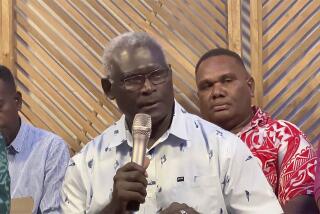Fijian President Named, Restoring Civilian Rule
- Share via
SUVA, Fiji — Racially torn Fiji returned to civilian rule Saturday after seven months of military leadership when Brig. Gen. Sitiveni Rabuka appointed former Governor General Penaia Ganilau as the republic’s first president.
In a nationwide broadcast to Fiji’s 715,000 people--mixed between indigenous Fijians and Indians mostly descended from laborers brought to the islands by the British--Rabuka said he hoped that the return to civilian rule would lead to Fiji being readmitted to the Commonwealth.
“It is my sincere hope that you will lead the way for Fiji to progress to a point where the historic link with the (British) crown can be re-established,” he told Ganilau.
Rights Protection
As a colonel, Rabuka, 39, led a bloodless coup in May that toppled a civilian parliamentary democracy dominated by ethnic Indians, who make up about 49% of the population. Rabuka said then that he feared that Fijians would be stripped of their constitutionally guaranteed land rights and prevented from regaining power.
Rabuka, an ethnic Fijian, staged a second coup Sept. 25 when it appeared that Ganilau, who as governor general was Queen Elizabeth II’s representative in Fiji, was about to agree to share power with ethnic Indians. Rabuka has governed the country since then with a 22-member army council.
On Oct. 7, Rabuka proclaimed Fiji a republic and Ganilau resigned as governor general, severing the nation’s 113-year association with the crown. Fiji, which attained independence in 1970, was later ousted from the Commonwealth, a grouping of former British colonies.
Names Prime Minister
Ganilau, in accepting the presidency, announced the appointment of Kamisese Mara as prime minister. As the leader of the native Fijian Alliance Party, Mara was prime minister for 17 years after the island nation gained independence. His party was defeated in April when Fijians elected the nation’s first Indian-majority government, a coalition of the National Federation Party and the Fiji Labor Party led by Timoci Bavadra. Bavadra was toppled in the May 14 coup.
Ganilau, who was handed the reins of government in a traditional Fijian ceremony that included presentation of a whale’s tooth, said Saturday that he had told Rabuka he would not accept the presidency unless he was satisfied with the new constitution. Two draft constitutions have been prepared--one by the officers of the Fijian military and the other by Kelemendi Bulewa, who is attorney general and justice minister.
“The details of the proposed constitution have not yet been worked out, but I have been able to give detailed consideration, both personally and through my advisers, to the proposals for the essential content of the constitution,” Ganilau said.
Political sources said it is unlikely that Rabuka will retire completely from the political spotlight and that he could be named to Mara’s Cabinet.
Mara is expected to name his Cabinet--most likely to comprise only 10 portfolios--soon, the sources said.
Fiji is a group of more than 300 islands in the South Pacific about 1,500 miles east of Australia.
More to Read
Sign up for Essential California
The most important California stories and recommendations in your inbox every morning.
You may occasionally receive promotional content from the Los Angeles Times.













